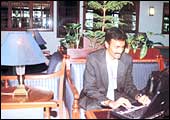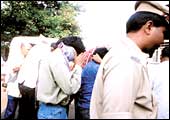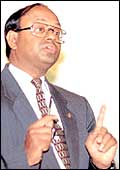 |
| Want WiMAX? Well, Dishnet
might answer your prayers |
When Dishnet DSL first entered the
market in 1998, only dial-up facilities were available. The industry
scoffed at the new broadband initiative-at the 128 kbps offered
at a premium-and at the business model. There were rollout problems
and servicing issues: TV cable operators cut overhead Dishnet
lines and road diggers spoilt the rest. Other telcos and internet
service providers also joined the game in 2002 and offered the
same 128 kbps service. But, by then, Dishnet had already upgraded
offerings to 512 kbps, and by 2004, sold the business to Tata's
vsnl for Rs 273 crore.
Wireless activity takes away some of the Indian imponderables,
such as road digging, feels C. Sivasankaran, Chairman, Sterling
Infotech Group, and promoter of Dishnet DSL. Today, the company
is planning Wi-Fi hotspots (6,000 in 18 months), even as pilot
wimax facilities are being tested. wimax is an external modem
that can be fitted into a laptop for mobility anytime-anywhere;
it also works with a pc. The connectivity is 512 kbps, says V.G.
Suriyanarayanan, Vice President, sales and marketing, Dishnet
DSL. With 5.7 lakh notebook owners in the country, and with penetration
growing at 200 per cent per annum, both services could take off
with a bang. (Dishnet already has 200 Wi-Fi hotspots). It has
lined up investments of Rs 250 crore for these initiatives and
hopes to break even in two years.
Sivasankaran has repeatedly said: "Not to make profits
is a sin; but to be sentimentally attached to a business forever
is foolish!" It's a belief he's turned into a tried and tested
business model: be the first mover, pioneer a new business, make
a success of it and then cash out. Will he do it again? Watch
this space.
-Nitya Varadarajan
Carlson
Calling
The Carlson Group is expanding in India.
 |
| Carlson Group's Nelson: Indian
hospitality beckons |
She enjoys being a grandmother more
than being a CEO, "but only just". Meet Marilyn Carlson
Nelson, 64, CEO of the $25-billion (Rs 1,10,000-crore) hospitality
and travel services provider Carlson Group. The Minneapolis-based
Carlson-which owns the Radisson, Park Plaza, Country Inn &
Suites hotel brands and the TGIF chain of restaurants-is in expansion
mode. "We have 22 hotels in India, and have signed contracts
for 14 new properties," informs Nelson. Also on the anvil:
plans to launch the top-end Regent Hotels brand in India. "I
believe, the travel industry in this country is poised for a boom,"
she adds. Interestingly, Carlson manages all its Indian properties
under contracts. However, Nelson points out that the Carlson Group
has invested money in its Wagonlit travel services joint-venture
in India and has also established IIMT (Institute for International
Management and Technology), a hotel management institute with
campuses in Kolkata and Gurgaon.
India is on her radar for another reason as well. She's scouting
for a BPO partner who can take care of Carlson's considerable
back-office functions. "But if we transfer some transactions
to India, jobs will be lost elsewhere. So, it is a very delicate
tightrope." she says. Going by her track record, it'll be
a breeze.
-Kushan Mitra
Good, Better, Oops!
Mphasis discovers just how fickle fortune
is.
 |
| Agents in the hood? Yup,
and they worked for Mphasis |
Six months after this magazine called
Mphasis Indian it's next big thing (see BT, June 6, 2004) and
barely a month after it described how the company was now trying
to buy its way out of trouble and to growth (see Acquire Or Die,
BT, April 10, 2005), the company surprised almost everyone with
a 32 per cent growth in revenues and a 26 per cent growth in earnings
(2004-05 over 2003-04). The modest growth of the IT services component
of this (22 per cent to Rs 481.47 crore, and this now accounts
for 62 per cent of the firm's revenues, down from 67 per cent
last year) is a cause for concern, not alarm. More immediately,
the company's results for the last three months (the period ending
March 31, 2005) were modestly-impressive with revenues increasing
29 per cent, earnings 23 per cent, and revenues from it services,
27.6 per cent.
Not long after, an international study of BPO (business process
outsourcing) firms (see The World's Best BPO in this section)
named Mphasis the world's fourth best BPO. The fact that it scores
over Wipro Spectramind, Progeon and other larger firms wouldn't
have been lost on the company.
If the celebrations have been muted, it is because Mphasis has
been embroiled in a controversy involving three former employees
of its call centre arm Msource who siphoned some Rs 1.5 crore
(around $340,000) off the accounts of some CitiGroup customers
in New York.
In a surprisingly well co-ordinated heist, the gang (some 14
people have thus far been arrested) obtained personal identification
numbers, and using an elaborate chain of false addresses and bank
accounts defrauded a few customers. "At no time does Mphasis
have access to pin numbers, which are required to access accounts.
While the case is still under investigation, it is assumed that
the fraudsters memorised account information and phone numbers
and contacted the consumers directly for the pin numbers,"
says the firm's chief executive Jerry Rao. In a classic demonstration
of bolting the stable door after the horses bolted, the company
has now tightened security procedures and India's National Association
of Software and Service Companies (NASSCOM) has called for a database
of all BPO employees. Meanwhile, unions in the West are gloating
and Mphasis is discovering just how fickle fortune can be.
-Rahul Sachitanand
OBITUARY
T. S. Santhanam 1912-2005
 |
A week before he breathed his last
in Chennai on April 15, Trichur Sundaram Santhanam was busy calling
up his sons and grandsons, checking on the outstandings on their
books. But such was Santhanam, son of TVS Group founder T.V. Sundaram
Iyengar: hands-on and passionate about business. "He loved
numbers", recalls his nephew and Sundaram Brake Linings Chairman
K. Mahesh. Joining his father's business when he was only 18,
Santhanam quickly established himself as the group's "money
man". In 1954, he set up Sundaram Finance, which still remains
one of the most respected finance companies in the country. Santhanam
equally loved sports. In the late 40s, he founded the Madras Greens,
a club that boasted of several top football players. A tennis
player and fan, Santhanam was often spotted in Wimbledon, cheering
Indian tennis champ Ramanathan Krishnan from the stands. "When
we think of JRD Tata, we only think of him foremost as a great
Indian, and that is what I wish to say of Santhanam," says
T.T. Srinivasaraghavan, Managing Director, Sundaram Finance, who
worked with Santhanam for the last two decades.
Back To Basics
The Razr helps Motorola's cause.
 |
| Nokia's Warrior: On to
the battlefield with tech-savvy tactics |
New boss ED Zander's gamble is beginning
to pay off. Facing an onslaught from Korean chaebols like Samsung
and LG and rejuvenated market leader Nokia, Zander, a former chief
of Sun Microsystems, decided that the $31.3-billion (Rs 1,37,720
crore) Motorola should fall back on its core engineering and design
capabilities. Its new anthem: seamless mobility. "We will
focus on accessing information from any device and any location
seamlessly," Padmasree Warrior, Motorola's Executive Vice
President and Chief Technology Officer told bt.
The restructuring worked: Motorola's Razr phone model boosted
sales by 35 per cent and helped it turn the corner. This slim
phone, made of space-age alloys, packs in Bluetooth, camera and
instant-messaging capabilities in a chic, ultra-modern, steel-grey
body. "Sure, we missed some trends, but we are in constant
touch with customers and partners to try and get a sense of what
the market wants," says Warrior, adding: "Motorola has
launched over 20 products in the last few months itself."
So, Motorola, which spent $3.5 billion (Rs 15,400 crore) or
11 per cent of its sales on R&D last year, will lean on research
centres (including one in Bangalore) to drive innovation. Its
Indian operations will also work on building a handset tailor-made
for emerging markets, Warrior discloses, adding that the first
such phone will hit the stores in mid-2006.
According to technology analysis firm Instat-mdr estimates,
Motorola's global market share in mobile phones at the end of
2004 stood at nearly 16 per cent, compared to under 13 per cent
for Samsung. Nokia is still the market leader with a 30 per cent
share of the market. "I don't see Motorola losing out to
Samsung and LG anymore," says Neil Strother, Senior Analyst,
Mobile Devices, Instat. That's indeed good news for a company
that invented the cell phone.
-Rahul Sachitanand
DEALMAKING
Going, Going, Boeing...
 |
| Boeing's Keskar: Price
conscious? |
Boeing seems to be flying away with
the game in India. Air-India is likely to place a massive Rs 51,000-crore
(close to $12 billion), 50-aircraft order with the US aerospace
major (Boeing will get $6 billion or Rs 26,400 crore; the rest
will go to other suppliers). The contract reportedly includes
eight 777-200LR ultra long-range aircraft, 15 777-300ER long-range
350-seater planes and 27 787-8 long-range 250-seater aircraft.
"These aircraft will offer Air-India both fleet commonality,
economy and reliability at a great price", boasts Dinesh
Keskar, Boeing VP, South Asia.
Boeing's European rival, Airbus Industrie, is obviously not
very pleased at this turn of events. "It is surprising that
Air-India has not considered the new Airbus A350, or the A380
double-decker aircraft," says Airbus spokesperson David Velupillai.
According to Civil Aviation Ministry sources, the Airbus offer
was deemed to be too expensive. There's more: Indian Airlines'
Rs 10,000-crore order for 43 planes might also go to Boeing. These
huge orders, it is learnt, will give India the political leverage
it so lacks on Capitol Hill.
-Kushan Mitra
|









